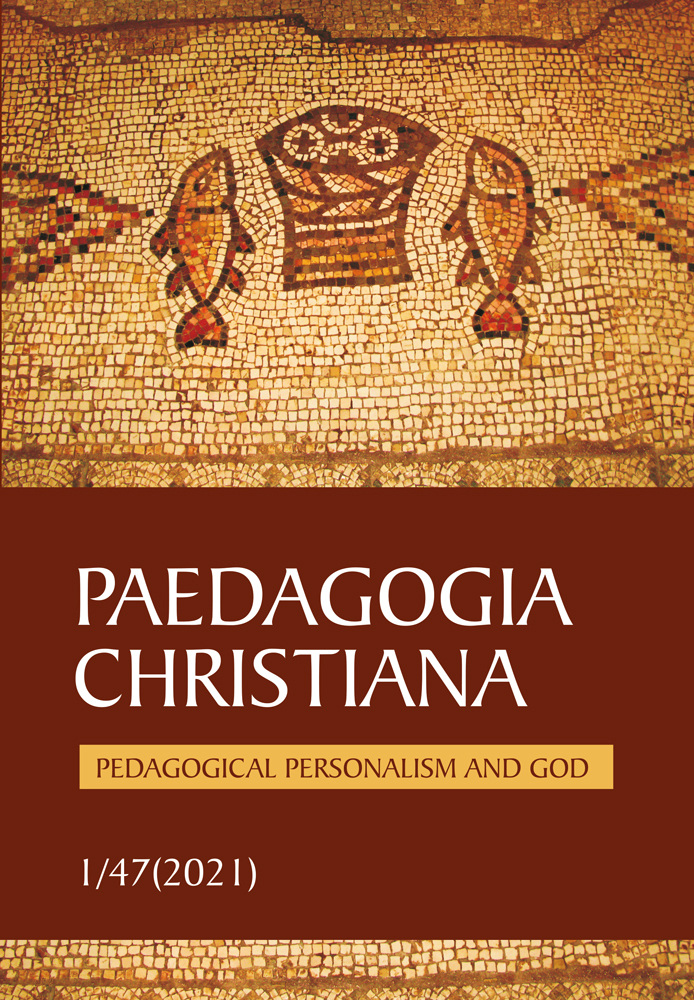Different Approach to the Concept of Subjectivity
DOI:
https://doi.org/10.12775/PCh.2021.011Keywords
subjectivity, self, concept, religion, educationAbstract
My paper is a kind of commentary on Paedagogia Christiana 2/44 (2019): Religious Education and the Development of Subjectivity. I consider three meanings of the term ‘subjectivity’: 1) specifically human, constant ability/disposition/potentiality; 2) changing and dynamic actualisation of this potentiality; 3) an authority as a result of being human. I also mention descriptive and axionormative
functions of this concept in the context of religious education.
References
Atkins, K. (2005). Self and Subjectivity. Edited with commentary by Kim Atkins. Blackwell Publishing Ltd.
Cavell, M. (2011). The Self Growth, Integrity, and Coming Apart. W: S. Gallagher (red.), The Oxford Handbook of the Self (s. 592–605). Oxford University Press.
Chopra, S. i White, L. F. (2011). A Legal Theory for Autonomous Artificial Agents. Michigan: University of Michigan Press.
Dalrymple, W. (2017). Dziewięć żywotów. Na tropie świętości we współczesnych Indiach. Wołowiec: Czarne.
Delumeau, J. (1998). Skrzydła anioła. Poczucie bezpieczeństwa w duchowości człowieka Zachodu w dawnych czasach. Warszawa: Volumen.
Foridi, L., Sanders, J. W. (2004). On the Morality of Artificial Agents. Minds and Machines, 14, 349–379.
Franciszek (2014). Wszyscy jesteśmy ostiariuszami (homilia podczas Mszy św. w kaplicy Domu św. Marty, 12.05.2014). Pobrano 15.03.2021 z: https://opoka.org.pl/biblioteka/W/WP/franciszek_i/homilie/swmarta_12052014.html.
Funes, J. G. (2008). “The Extraterrestrial is my Brother”. The Relationship between Astronomy and Faith. L’Osservatore Romano (May 14, 2008).
Gasiul, H. (2016). Podmiotowość z perspektywy wybranych teorii psychologicznych. Psychologia Rozwojowa, 21(3), 9–24.
Gielen, U. P., Kim, S. (2018). Global Changes in Children’s Lives. Cambridge.
Greshake, G. (2009). Trójjedyny Bóg. Teologia trynitarna. Wrocław: TUM.
Himma, K. (2009). Artificial agency, consciousness, and the criteria for moral agency: what properties must an artificial agent have to be a moral agent?. Ethics and Information Technology, 11, 19–29.
Horowski, J., Sadłoń, W. (2019). Editorial. Paedagogia Christiana, 44(2), 5–8.
Ingarden, R. (1973). Książeczka o człowieku. Kraków: Znak.
Jasnos, R. (2019). Subjective Biblical Discourse as the Basis of Education for Relationships. Discursive Interpretation Supplementing the Theological Synthesis. Paedagogia Christiana, 44(2), 33–46. http://dx.doi.org/10.12775/PCh.2019.040
Kąkol, T. (2017). Ja, substancja duchowa. Filozofuj!, 1(13), 14–16.
Kiereś, B. (2018), Człowiek: podmiot wychowania czy jego funkcja. Zeszyty Naukowe KUL, 61(4), 257–266.
Legrand, D. (2011). Phenomenological Dimensions of Bodily Self-Consciousness. W: S. Gallagher (red.), The Oxford Handbook of the Self (s. 204–227). Oxford University Press.
Malafouris, L. (2007). At the Potter’s Wheel: An Argument for Material Agency. W: C. Knappett, L. Malafouris (red.), Material Agency: Towards a Non-Anthropocentric Approach (s. 19–36). Springer.
Marek, Z., Walulik, A. (2019). Subjectivity in (of) Education. The Perspective of the Gospel. Paedagogia Christiana, 44(2), 11–32. http://dx.doi.org/10.12775//PCh.2019.039
Metzinger, T. (2019). Tunel Ego. Naukowe badanie umysłu a mit świadomego Ja. Łódź: Wydawnictwo Uniwersytetu Łódzkiego.
Pietrzykowski T. (2017). Ludzkie, niezbyt ludzkie: esej o podmiotowości prawnej i wyzwaniach XXI wieku. Katowice: Wydawnictwo Uniwersytetu Śląskiego.
Piłat, R. (2013). Aporie samowiedzy. Warszawa: Wydawnictwo IFiS PAN.
Salamucha, A. (2018). Pojęcie podmiotowości w pedagogice. Zeszyty Naukowe KUL, 61(4), 309–317.
Siderits, M. (2011). Buddhist Non-Self: The No-Owner‘s Manual. W: S. Gallagher (red.), The Oxford Handbook of the Self (s. 297–315). Oxford University Press.
Sztompka, P. (2005). Socjologia. Analiza społeczeństwa. Kraków: Znak.
Warmbier, A. (red.). (2016). Spór o podmiotowość – perspektywa interdyscyplinarna. Kraków: Księgarnia Akademicka.
Wiener, N. (1964). God & Golem, Inc.: A Comment on Certain Points Where Cybernetics Impinges on Religion. MIT Press.
Zahavi, D. (2011). Unity of Consciousness and the Problem of Self. W: S. Gallagher (red.), The Oxford Handbook of the Self (s. 316–335). Oxford University Press.
Downloads
Published
How to Cite
Issue
Section
License

This work is licensed under a Creative Commons Attribution-NoDerivatives 4.0 International License.
Stats
Number of views and downloads: 1678
Number of citations: 0



